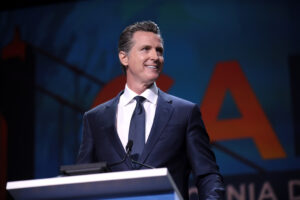
Quote: “Realistically, too much damage has been done, and the situation is too far gone for this level of lackluster international cooperation to save anyone, much less the planet.”
California Governor Gavin Newsom, in a move that came as a slight surprise to Americans, traveled to China to meet with President Xi Jinping on the topic of climate change and discussions of clean energy. As tensions between China and the U.S. continue to grow, this visit has a lot of meaning. With U.S. carbon emissions continuing to rise and China on record as the current largest contributor, the need for climate cooperation between the two countries is beyond desperation. This meeting served as a platform for dialogue between an American politician and the Chinese government, which has been sorely lacking as of late. While this meeting is merely a conversation, it opens the door for Washington to engage with China in spite of recent events.
This move could be interpreted as a political move on Newsom’s part to be seen as a national figure and gain momentum for a presidential run in 2028, and that isn’t out of the question. But despite the possible craven motivations, Newsom’s trip to China is a smart decision for the U.S. There has been debate that this meeting could serve as a step towards a meeting between President Biden and President Xi Jinping at the Asia-Pacific Economic Cooperation summit in San Francisco. However, these exchanges are important regarding what it means for international politics and economic issues, not climate change.
The visit contained talks beyond pressuring China on climate cooperation, specifically on human rights abuses, China’s stances on Tibet and Taiwan, the imprisonment of a California resident and China’s role in the flow of Fentanyl to the U.S. with Newsom initially stating those topics would not be on the table at the express frustration of several American politicians. Though this visit was supposed to be about climate change, there isn’t much evidence that the visit will affect China’s policies, which can’t be seen as capitulating to pressure from the U.S. It’s clear that Newsom and Xi’s meeting, while it straightforwardly faced issues, did nothing to address the problems. The visit shows the possibility of cooperation, but it was not a sign of thawing relations or tangible action.
With the issue of climate change on the table, this meeting is another example of too little, too late. The effects of climate change will be catastrophic, with nearly half of the world’s population living in areas described as “highly vulnerable to climate change” in a report by the UN’s Intergovernmental Panel on Climate Change. In the last decade, deaths due to natural disasters have been 15 times higher in these areas. For California, climate change needs to be a priority after the extreme winter storms and flooding endangered residents and led to the announcement of a whopping, and yet still not nearly enough, $95 million to help flood victims. Newsom is right in making this a priority discussion with China, but his efforts are essentially pointless. Realistically, too much damage has been done, and the situation is too far gone for this level of lackluster international cooperation to save anyone, much less the planet.
This trip might boost Newsom when it comes to viewing him as a presidential contender, but it doesn’t mean a lot when it comes to reality. Decisive and clear action is required in addressing climate change, and this visit was merely another in a long string of disappointments for the international community. The situation is beyond calling attention and garnering awareness, and to do anything less than holding major carbon emitters like China and the U.S. accountable is a gross failure of grievous proportions.








